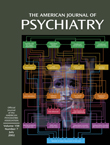Change in Criterion for Paraphilias in DSM-IV-TR
To the Editor: In the introduction to DSM-IV-TR (p. xxix), the following unequivocal statement is made concerning its changes from DSM-IV: “As with the original DSM-IV, all changes proposed for the text had to be supported by empirical data. Furthermore, all proposed changes were limited to the text sections (e.g., Associated Features and Disorders, Prevalence). No substantive changes in the criteria sets were considered.” This claim is misleading. In fact, DSM-IV-TR has made a substantive change to criterion B for paraphilias. The only way the reader would know of this change would be to read all of Appendix D (“Highlights of Changes in DSM-IV Text Revision”) to discover that a change had been made in the paraphilia criteria set (p. 840).
In DSM-IV (p. 523), criterion B for all paraphilias was, “The behavior, sexual urges, or fantasies cause clinically significant distress or impairment in social, occupational, or other important areas of functioning.” The editors of DSM-IV-TR apparently recognized the unintended and clinically absurd consequence of the change in DSM-IV from DSM-III-R criterion B. According to DSM-IV, the diagnosis of pedophilia cannot be made if the individual acts on pedophilic urges but is not distressed by the urges and is not socially or occupationally impaired. In DSM-III-R, however, acting on the urges alone meets criterion B, as is the case again in DSM-IV-TR for pedophilia and all of the other paraphilias that involve a nonconsenting person.
This welcome change in the DSM-IV-TR criteria is certainly substantive. Would it not have been better for the DSM-IV-TR editors to acknowledge that they had made a few substantive changes in the criteria and that they had corrected a mistake made in DSM-IV for the paraphilias?



